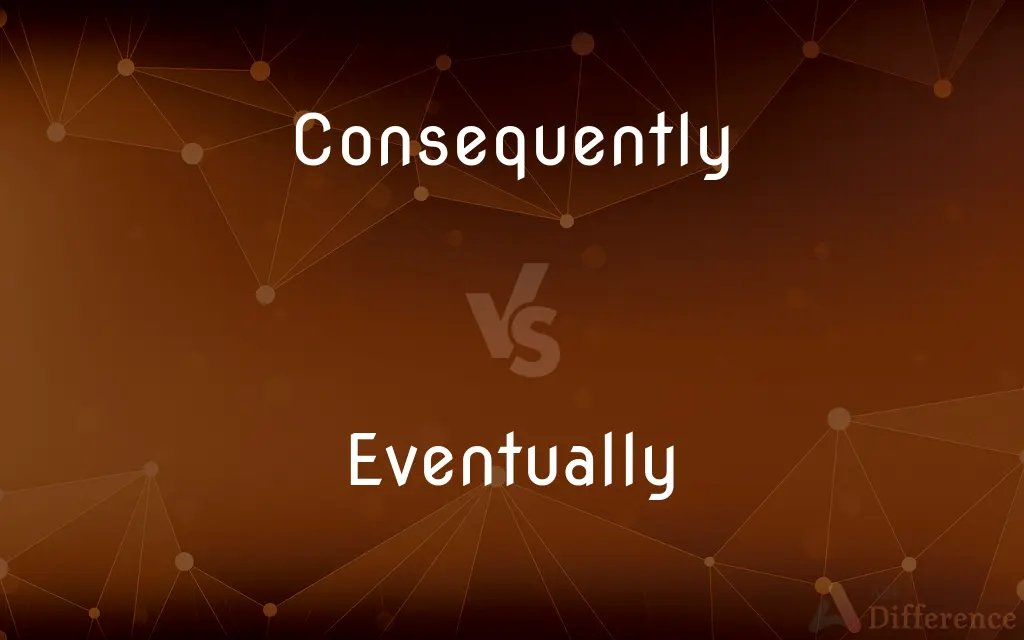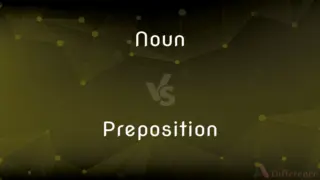Consequently vs. Eventually — What's the Difference?
By Tayyaba Rehman — Published on September 20, 2023
"Consequently" indicates a result due to a cause, while "Eventually" refers to something happening in the end or after some time.

Difference Between Consequently and Eventually
Table of Contents
ADVERTISEMENT
Key Differences
"Consequently" is primarily used to establish a cause-and-effect relationship between two statements. When something happens as a result of a particular action or decision, we use this term to show that relationship. On the other hand, "Eventually" deals with time, indicating that something will or did happen after a while or in the end.
For instance, if someone neglects their health, they might face health issues. "Consequently" fits well here, showing the outcome of neglect. Meanwhile, "Eventually" would be used to describe the passing of time, like how one might finally reach a destination after traveling for hours. The emphasis isn't on cause and effect, but on the progression of time.
Using "Consequently" in a sentence often indicates logical progression or consequence. It's as if saying, "Because of this, that happened." "Eventually," however, brings a sense of inevitability or culmination. When one says, "It eventually rained," they're noting that the rain, though delayed, was bound to come.
Both "Consequently" and "Eventually" serve as transition words, guiding readers or listeners through a narrative or argument. But while "Consequently" guides through the outcomes of actions or decisions, "Eventually" walks one through the passage of time until a particular event takes place.
Comparison Chart
Primary Use
Indicates result due to a cause
Refers to an event happening after some time
ADVERTISEMENT
Type
Cause and effect conjunction
Time-based adverb
Sentence Role
Shows outcome of a previous statement
Indicates culmination or inevitability of an event
Temporal Element
Not necessarily time-based
Directly related to the passage of time
Example Usage
"He forgot his umbrella; consequently, he got wet."
"She kept practicing and eventually mastered the skill."
Compare with Definitions
Consequently
Consequently shows a direct result of a prior action.
He didn't study; consequently, he failed the test.
Eventually
Eventually means after a period of time or in the end.
He was lost but eventually found his way home.
Consequently
Consequently indicates a cause-and-effect relationship.
The roads were icy; consequently, school was canceled.
Eventually
Eventually marks the final result after a series of events.
After many attempts, he eventually climbed the mountain.
Consequently
Consequently introduces a statement that follows logically from a previous statement.
The book was in high demand; consequently, it was sold out.
Eventually
Eventually is used to show something will happen later.
You'll understand the concept eventually.
Consequently
Consequently is used to introduce an outcome or effect.
She was late; consequently, she missed the bus.
Eventually
Eventually denotes a culmination of events over time.
With persistence, she eventually succeeded.
Consequently
Consequently points to a logical outcome.
He ate too much candy; consequently, he felt sick.
Eventually
Eventually signifies an inevitable occurrence in the future.
If you keep spending recklessly, you'll eventually run out of money.
Consequently
As a result; therefore.
Eventually
In the end, especially after a long delay, dispute, or series of problems
Eventually, after midnight, I arrived at the hotel
Consequently
(conjunctive) As a result or consequence of something; subsequently.
He didn't wake up early. Consequently, he was late to work.
Eventually
At an unspecified future time
Eventually rose to the position of vice president.
Consequently
Subsequently, following after in time or sequence.
Eventually
In the end; at some later time, especially after a long time, a series of problems, struggles, delays or setbacks.
Everyone's true colors will be revealed eventually.
Consequently
By consequence; by natural or logical sequence or connection.
Eventually
For some tail; for all terms beyond some term; with only finitely many exceptions.
Eventually, all prime numbers are odd.
Consequently
(sentence connectors) because of the reason given;
Consequently, he didn't do it
Continued to have severe headaches and accordingly returned to the doctor
Eventually
Possibly, potentially, perhaps
I will come eventually, but haven't decided yet.
Consequently
As a consequence;
He had good reason to be grateful for the opportunities which they had made available to him and which consequently led to the good position he now held
Eventually
In an eventual manner; finally; ultimately.
Eventually
Within an indefinite time or at an unspecified future time;
He will understand eventually
He longed for the flowers that were yet to show themselves
Sooner or later you will have to face the facts
In time they came to accept the harsh reality
Eventually
After a long period of time or an especially long delay;
At length they arrived
Common Curiosities
Does "Eventually" indicate immediate or future occurrence?
"Eventually" indicates something will happen in the future or after some time.
Can "Consequently" be replaced with "Therefore"?
Yes, "Consequently" can often be replaced with "Therefore" to indicate a result.
What type of transition does "Consequently" provide?
"Consequently" provides a cause-and-effect transition.
Is "In the end" a synonym for "Eventually"?
Yes, "In the end" can often be used interchangeably with "Eventually."
Does "Consequently" always indicate a negative outcome?
No, "Consequently" can indicate both positive and negative outcomes.
Is "Consequently" more formal than "So"?
Yes, "Consequently" is often seen as more formal than "So" when indicating a result.
Which is time-based: "Consequently" or "Eventually"?
"Eventually" is time-based, while "Consequently" is cause-and-effect based.
What's the difference between "Eventually" and "Finally"?
While both indicate time, "Finally" stresses the end of a process, while "Eventually" emphasizes delay.
How does "Consequently" relate to cause and effect?
"Consequently" shows the effect of a prior cause or action.
Is "Eventually" always related to time?
Yes, "Eventually" denotes an event's occurrence after a period of time.
Can "Eventually" indicate uncertainty?
While "Eventually" indicates a delay, it doesn't necessarily imply uncertainty.
Can "Eventually" be used to describe past events?
Yes, "Eventually" can describe events that happened after a delay in the past.
Does "Eventually" always mean something positive will happen?
No, "Eventually" is neutral; it just indicates time passage, not the nature of the event.
How can "Consequently" be used in argumentative writing?
"Consequently" can show the results of a presented argument or statement.
Can "Consequently" start a sentence?
Yes, "Consequently" can start a sentence to introduce a resulting action.
Share Your Discovery

Previous Comparison
Noun vs. Preposition
Next Comparison
Mainland vs. IslandAuthor Spotlight
Written by
Tayyaba RehmanTayyaba Rehman is a distinguished writer, currently serving as a primary contributor to askdifference.com. As a researcher in semantics and etymology, Tayyaba's passion for the complexity of languages and their distinctions has found a perfect home on the platform. Tayyaba delves into the intricacies of language, distinguishing between commonly confused words and phrases, thereby providing clarity for readers worldwide.













































